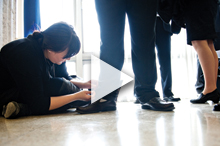The results are in. Only one point separated the two teams, with the Blue team coming out on top. They cheer and high-five each other as they realize they will go to the state competition.
The celebration, though, is short-lived; Robinson says the Maize team will not go to States. "Everyone said we should have ended up with two bids, and I think we would have if we hadn't met up in the third round. The math beat us."
In the hallway, they all hug and cry. They are all so close that one team's success feels diminished by the other team's disappointment.
Lucy Smith embraces her sister, Sally, just a freshman but already a strong attorney who approaches Lucy's levels of confidence and poise in the courtroom. It isn't fair, someone says. They could be talking about the day's results, or high school, or life in general. At this moment, in this courthouse hallway, nothing seems fair.

Two weeks later, the Blue team competes in the state tournament in Lansing. Most of the Maize team is there to cheer them on. After two strong rounds, Feldsherov says he guesses the scoring was close, but he thinks the Ypsi team won both times.
All 10 teams from around the state gather in a room to hear the results. Ypsi's Maize and Blue teammates sit in a row, their hands interlocked, as the four semi-finalists are announced. Could they repeat the previous year's success as one of the top four teams in the state?
Alas, no. In spite of the impressive performances, they do not advance. Wide-eyed, they prepare to head back to the bus. Robinson pulls them to the side and says he understands their disappointment, but he is very proud of the way they performed. Now let's all clap for Shay Curry, who is graduating this year, he says.
And then, pointedly, he reminds them of the best news of all: "Everyone else is coming back." That means that 2011–12 should be a very good year indeed.